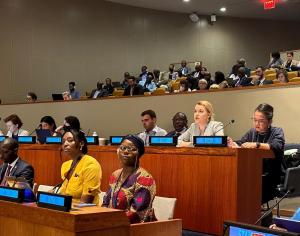
Taking part in the High-Level Political Forum on Sustainable Development in New York (8 – 17 July), UNECE Executive Secretary Tatiana Molcean presented UNECE regional perspectives on SDGs localization, climate action, energy, transport, water and engaged with civil society, youth, and the private sector. She also met with leaders from governments, UN Regional Commissions and UN partners, to advance cooperation ahead of the Summit of the Future in September this year.
Presenting messages from the UNECE region, Ms. Molcean called for targeted polices in key transition areas, namely:
-
Investment in green and decent jobs;
-
Sustainable agriculture and food systems;
-
Climate risk mitigation and social protection;
-
Access to justice, participation and local governance.
Delivering a message on behalf of all five UN Regional Commissions regarding climate action, Ms. Molcean stressed that all regions must enhance climate finance for both mitigation and adaptation efforts. She reminded that effective climate initiatives can positively impact various SDGs, including poverty, health, water, clean energy, innovation, employment, and more, fostering a future where sustainability and prosperity go hand in hand.
Speaking at an HLPF event about accelerating global energy transition and connectivity to advance SDGs, the UNECE Executive Secretary noted that enhancing regional energy connectivity and energy trade through cooperation is a critical factor to improve the resiliency of the energy system and the energy security. In that respect, UNECE is working with ESCAP to enhance energy connectivity in Central Asia and the Caucasus. It is also joining forces with a coalition of global organizations to create an AI-powered platform aimed at transforming our energy systems and aligning them with the goals of the Paris Agreement to strike a balance between ensuring energy security, affordability, and environmental sustainability.
Participating in a session on transforming from the ground up, Ms. Molcean reminded that achieving the 2030 Agenda for Sustainable Development depends not only on national governments but also concerted local efforts. Speaking on behalf of UNECE, ESCAP, ECLAC, ESCWA and ECA, she highlighted the importance of localizing the SDGs as a shared responsibility and underlined the key role of platforms, such as the UNECE-convened Forum of Mayors. Briefing Ambassadors to the United Nations in New York, Ms. Molcean urged Member States to actively involve cities in relevant UN work, in order to promote a more inclusive and dynamic multilateralism. The Forum of Mayors is the kind of inclusive multilateral body that the Pact for the Future is expected to call for.
Attending the UN-Water Principals Meeting, Ms. Molcean welcomed the first UN system-wide strategy on water and sanitation, and outlined UNECE’s support to UN Member States to establish and strengthen climate-resilient legal and institutional frameworks for transboundary water cooperation.
“Reinforcing cross-border cooperation through the UN Water Convention can enhance governance, drive climate action and strengthen the foundation for peace,” she underlined.
The relevance of the Water Convention, which is serviced by UNECE, was confirmed this week when Cote d’Ivoire became the 10th African nation and 53rd Party to join the Convention.
Speaking of the critical role of energy transition minerals in accelerating progress towards SDGs, Ms. Molcean reminded that the UN Framework Classification for Resources (UNFC) and the UN Resource Management System (UNRMS), developed by UNECE, provide a globally recognized framework for their sustainable and integrated management. They ensure transparency, comparability, resource reporting and management efficiency, essential for attracting sustainable investments and fostering international cooperation. They help align resource management practices with the SDGs, promoting economic growth while ensuring environmental sustainability and social responsibility, Ms. Molcean stressed.
Advancing cooperation to accelerate SDGs progress at both regional and global level was the focus of Executive Secretary’s exchanges with representatives of Armenia, Czech Republic, Canada, European Union, Kazakhstan, Spain, Tajikistan, Turkmenistan and United States, particularly with respect to climate action, energy, environment, gender, transport, and urban development.

